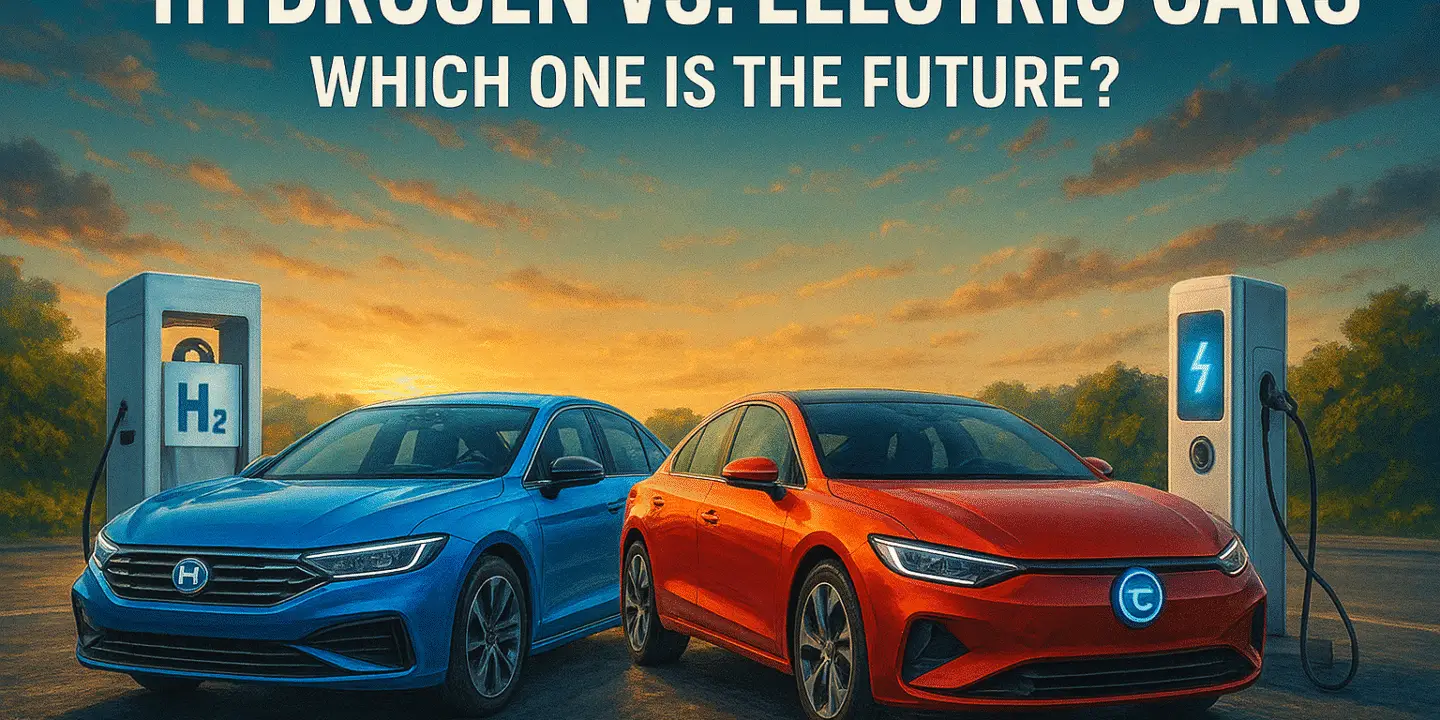
Table of Contents
As the world accelerates toward a greener future, the race between hydrogen fuel cell vehicles (FCVs) and electric vehicles (EVs) is heating up. Both technologies promise reduced carbon footprints and sustainable transportation, but they differ significantly in infrastructure, efficiency, and overall feasibility. This article explores the key differences, advantages, and challenges of hydrogen and electric cars to determine which is more likely to dominate the future of mobility.
What Are Hydrogen and Electric Cars?
Hydrogen Fuel Cell Vehicles (FCVs): Hydrogen cars utilize fuel cells to convert hydrogen gas into electricity, powering an electric motor. The only byproduct of this process is water vapor, making FCVs a zero-emission vehicle type. Hydrogen can be produced from renewable sources or natural gas through a process called electrolysis.
Electric Vehicles (EVs): EVs run on electricity stored in large battery packs. These vehicles are charged by plugging into an external power source. Unlike FCVs, EVs rely on lithium-ion or solid-state batteries, making them highly efficient and widely available today.
Efficiency and Energy Conversion
Hydrogen Cars: FCVs have a lower energy efficiency compared to EVs. Converting electricity to hydrogen through electrolysis and then back to electricity in the car leads to significant energy losses. The overall efficiency of hydrogen vehicles is around 30-40%.
Electric Cars: EVs are more energy-efficient, with an overall efficiency of around 70-90%. Electricity from the grid is directly stored in the battery and powers the car without major conversion losses.
Verdict: When it comes to energy efficiency, EVs are the clear winner due to their direct use of electricity and minimal energy loss during conversion.
Infrastructure and Refueling/Charging Time
Hydrogen Cars: Hydrogen refueling stations are still relatively scarce. Building a hydrogen infrastructure is costly and complex due to the need for specialized storage and transportation systems. However, FCVs can refuel in about 3-5 minutes, offering a similar experience to refueling a gasoline car.
Electric Cars: The EV charging network is rapidly expanding, with Level 2 and Level 3 (DC fast chargers) becoming more common. However, charging times vary significantly, ranging from 30 minutes for a fast charge to 8 hours for a full home charge. The convenience of home charging is a major advantage for EV owners.
Verdict: While hydrogen cars offer faster refueling, EVs have a more extensive and growing charging infrastructure, making them more practical for most drivers.
Range and Performance
Hydrogen Cars: FCVs generally offer a longer range compared to most EVs. Hydrogen cars can travel around 300-400 miles on a full tank, making them suitable for long-distance driving.
Electric Cars: The range of EVs varies widely by model. High-end models, such as the Tesla Model S, can achieve over 400 miles per charge, while smaller EVs may have a range of 150-250 miles. The range is also affected by temperature and driving habits.
Verdict: While hydrogen vehicles currently have a slight edge in range, advancements in EV battery technology are closing the gap quickly.
Environmental Impact
Hydrogen Cars: Hydrogen is a clean fuel, but its production is not always green. Most hydrogen is produced using natural gas, which generates emissions. Green hydrogen, produced using renewable energy, is still in its infancy and costly to produce.
Electric Cars: EVs have no tailpipe emissions, but their environmental impact depends on how the electricity is generated. In regions with clean energy grids, EVs are significantly greener. Battery production, however, has an environmental footprint due to mining and manufacturing processes.
Verdict: EVs currently have a lower overall carbon footprint, but the sustainability of hydrogen cars could improve with the increased use of green hydrogen.
Cost and Affordability
Hydrogen Cars: FCVs are currently more expensive than EVs due to limited production and costly fuel cell technology. Hydrogen fuel itself is also more expensive per mile compared to electricity.
Electric Cars: EVs have become more affordable due to mass production and decreasing battery costs. Government incentives and tax credits make EV ownership even more appealing.
Verdict: EVs are more affordable and accessible, making them the more practical choice for most consumers.
The Future of Mobility: Hydrogen or Electric?
Hydrogen’s Potential: Hydrogen may play a significant role in heavy-duty transportation, such as trucks, buses, and ships, where long range and quick refueling are crucial. Hydrogen fuel cells could also support grid storage and industrial applications, reducing reliance on fossil fuels.
Electric Cars’ Dominance: EVs are leading the passenger car market due to their efficiency, lower costs, and expanding charging networks. With ongoing battery improvements and falling prices, EVs are likely to dominate personal transportation in the coming decades.
Conclusion
While hydrogen cars offer promising technology, electric vehicles are currently the more viable and practical option for the average consumer. EVs boast higher efficiency, lower costs, and a rapidly growing infrastructure. However, hydrogen has a promising future in commercial transportation and industrial applications. As renewable energy advances, both technologies could play complementary roles in building a sustainable transportation future.





